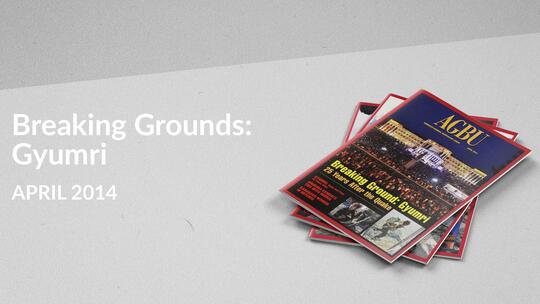Journalist Vahan Ishkhanian still remembers the shock of his colleagues when he published an article about a gay man's arrest for sodomy in 2002. The article stirred harsh debates in Armenia's conservative society, Ishkhanian says, and many questioned why the reporter would put his reputation on the line to tackle the controversial subject.
"Ten years ago, even a story about a gay person's existence was itself a sensation," said Ishkhanian, 49.
That experience contrasts starkly with the current situation of advocacy and greater acceptance. A decade after Armenia decriminalized homosexuality, the topic remains divisive, but is gaining attention according to human rights activists.
"Society's rhetoric has drastically changed," said Ishkhanian. "We see organizations lobbying for gay rights. We see gays who are coming out, even in small circles of their friends, and we see people changing their attitudes from radically negative to moderately tolerant."
A milestone was reached on December 2, when activists raised the rainbow flag—a universal symbol of LGBT rights—in public, at a demonstration during a state visit by President Vladimir Putin of Russia, whose policies toward homosexuals came under harsh international criticism in the run-up to the Sochi Olympics. The rainbow flag infuriated a faction of the crowd, who attacked the activists. Still, the group kept their flag flying.
Legal Victory
Sexual minorities in Armenia have watched their community go from taboo to a national debate played out on social networks and in public discussions in recent years. But they continue to face social challenges in an often-hostile atmosphere, activists say.
"Society is misinformed, intimidated, and that begets violence and aggression towards the LGBT (Lesbian, Gay, Bisexual & Transgender) community," said Mamikon Hovsepyan, head of PINK Armenia, which stands for Public Information and Need of Knowledge, and was founded in 2007.
In a recent study conducted by PINK in Armenia, over 70 percent of respondents identified themselves as homophobic.
Hovsepyan says that after the decriminalization of homosexuality, sexual minorities in Armenia now face a different set of obstacles—from discrimination in gaining employment and healthcare, to harassment and violence, to an inability to lead an open lifestyle.
Yet activists gained a major victory last fall 2013 with the defeat of an anti-LGBT bill in parliament.
The Armenian police came under a storm of criticism for the controversial draft legislation, which would have stipulated fines between $6,000-12,500 USD for the promotion of "non-traditional sexual relations."
In response, dozens of prominent Diasporan-Armenians signed a statement calling for equality and justice for all people in Armenia—with an emphasis on sexual minorities.
"The attempts to codify antigay prejudice into law are contrary to our values," said the petition, whose signatories included Canadian-Armenian filmmaker Atom Egoyan, Canadian-Armenian actress Arsinee Khanjian and Armenian- American heavy metal musician Serge Tankian.
The proposal has since been removed from the police website and media reports indicate there are no immediate plans for parliament to consider it.
Sevak: Fighting To Be Himself
Despite the difficulties and stigma, some young Armenians are opening up about their sexual orientation to their families, and gaining surprising acceptance.
Sevak, 24, is a liberal and self-confident civil activist, but recalls the days when he felt dejected.
"My family is a traditional Armenian family. My mom used to say homosexuals are not human beings. She hated gays. When I was 14, I wrote in my diary that homosexuality is disgraceful, and I should eradicate that illness," he said.
Sevak finally came to terms with his identity in his late teens, when he found empathetic friends and human rights organizations in Yerevan, such as PINK. Though coming out was stressful, eventually his family came to terms with it. He forgives his mother's attitude during his youth. "It was her attempt to protect me, as she guessed I was different."
"I never talked to my father, but at least my mother and sisters know, and it is a great relief for me," he added. Despite the threats he receives via Facebook, Sevak is happy and dreams of one day building his own family.
"I know many gays who are forced to live a double life: they marry a woman, pretend to be a homophobe to hide their homosexuality and then suffer all their lives," said Sevak.
"I know many who left the country. But I believe they should stay and fight for their right to lead a normal life in their own land.






